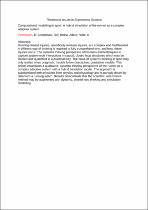 ResearchSpace
ResearchSpace
Computational modelling in sport: A hybrid simulation of the runner as a complex adaptive system
JavaScript is disabled for your browser. Some features of this site may not work without it.
- ResearchSpace
- →
- Research Publications/Outputs
- →
- Journal Articles
- →
- View Item
| dc.contributor.author |
Vermeulen, E

|
|
| dc.contributor.author |
Grobbelaar, SS

|
|
| dc.contributor.author |
Botha, Adèle

|
|
| dc.contributor.author |
Nolte, K

|
|
| dc.date.accessioned | 2021-11-26T08:05:45Z | |
| dc.date.available | 2021-11-26T08:05:45Z | |
| dc.date.issued | 2021-10 | |
| dc.identifier.citation | Vermeulen, E., Grobbelaar, S., Botha, A. & Nolte, K. 2021. Computational modelling in sport: A hybrid simulation of the runner as a complex adaptive system. <i>Theoretical Issues in Ergonomics Science.</i> http://hdl.handle.net/10204/12175 | en_ZA |
| dc.identifier.issn | 1464-536X | |
| dc.identifier.issn | 1463-922X | |
| dc.identifier.uri | https://doi.org/10.1080/1463922X.2021.1983885 | |
| dc.identifier.uri | http://hdl.handle.net/10204/12175 | |
| dc.description.abstract | Running-related injuries, specifically overuse injuries, are complex and multifaceted. A different way of thinking is required to fully comprehend why, and how, these injuries occur. The systems thinking perspective offers tools and techniques to capture system-wide interactions in causal, closed-loop structures which may be studied and quantified in a practical way. The value of systems thinking in sport may only realise when pragmatic models follow descriptive, qualitative models. This article instantiates a qualitative, systems thinking perspective of the runner as a complex adaptive system with a hybrid simulation model. The approach is substantiated with principles from physics and physiology and is partially driven by data from a running watch. Results demonstrate that the scientific, reductionist method may be augmented with dynamic, closed-loop thinking and simulation modelling. | en_US |
| dc.format | Abstract | en_US |
| dc.language.iso | en | en_US |
| dc.relation.uri | https://www.tandfonline.com/doi/full/10.1080/1463922X.2021.1983885 | en_US |
| dc.source | Theoretical Issues in Ergonomics Science | en_US |
| dc.subject | Complex Adaptive System | en_US |
| dc.subject | Running wearables | en_US |
| dc.subject | Running related overuse | en_US |
| dc.subject | Simulation modelling | en_US |
| dc.subject | Systems thinking | en_US |
| dc.title | Computational modelling in sport: A hybrid simulation of the runner as a complex adaptive system | en_US |
| dc.type | Article | en_US |
| dc.description.pages | 25 | en_US |
| dc.description.note | © 2021 Informa UK Limited, trading as Taylor & Francis Group. Due to copyright restrictions, the attached PDF file only contains the abstract of the full text item. For access to the full text item, please consult the publisher's website: https://www.tandfonline.com/doi/full/10.1080/1463922X.2021.1983885 | en_US |
| dc.description.cluster | Next Generation Enterprises & Institutions | en_US |
| dc.description.impactarea | Software Architectures & Solutions | en_US |
| dc.identifier.apacitation | Vermeulen, E., Grobbelaar, S., Botha, A., & Nolte, K. (2021). Computational modelling in sport: A hybrid simulation of the runner as a complex adaptive system. <i>Theoretical Issues in Ergonomics Science</i>, http://hdl.handle.net/10204/12175 | en_ZA |
| dc.identifier.chicagocitation | Vermeulen, E, SS Grobbelaar, Adele Botha, and K Nolte "Computational modelling in sport: A hybrid simulation of the runner as a complex adaptive system." <i>Theoretical Issues in Ergonomics Science</i> (2021) http://hdl.handle.net/10204/12175 | en_ZA |
| dc.identifier.vancouvercitation | Vermeulen E, Grobbelaar S, Botha A, Nolte K. Computational modelling in sport: A hybrid simulation of the runner as a complex adaptive system. Theoretical Issues in Ergonomics Science. 2021; http://hdl.handle.net/10204/12175. | en_ZA |
| dc.identifier.ris | TY - Article AU - Vermeulen, E AU - Grobbelaar, SS AU - Botha, Adele AU - Nolte, K AB - Running-related injuries, specifically overuse injuries, are complex and multifaceted. A different way of thinking is required to fully comprehend why, and how, these injuries occur. The systems thinking perspective offers tools and techniques to capture system-wide interactions in causal, closed-loop structures which may be studied and quantified in a practical way. The value of systems thinking in sport may only realise when pragmatic models follow descriptive, qualitative models. This article instantiates a qualitative, systems thinking perspective of the runner as a complex adaptive system with a hybrid simulation model. The approach is substantiated with principles from physics and physiology and is partially driven by data from a running watch. Results demonstrate that the scientific, reductionist method may be augmented with dynamic, closed-loop thinking and simulation modelling. DA - 2021-10 DB - ResearchSpace DP - CSIR J1 - Theoretical Issues in Ergonomics Science KW - Complex Adaptive System KW - Running wearables KW - Running related overuse KW - Simulation modelling KW - Systems thinking LK - https://researchspace.csir.co.za PY - 2021 SM - 1464-536X SM - 1463-922X T1 - Computational modelling in sport: A hybrid simulation of the runner as a complex adaptive system TI - Computational modelling in sport: A hybrid simulation of the runner as a complex adaptive system UR - http://hdl.handle.net/10204/12175 ER - | en_ZA |
| dc.identifier.worklist | 25058 | en_US |





